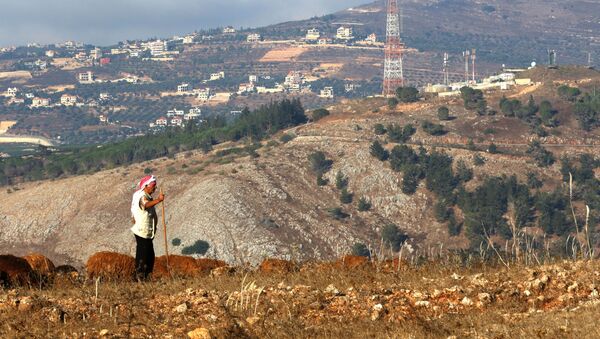The Jewish state doesn't take the danger emanating from Hezbollah, a Shiite militia linked to Iran, lightly, especially given the past hostilities between the two states and the abundance of threats thrown in Israel's way in the past several months.
For Hezbollah, which was founded in response to Israel's role in the 1982 Lebanon War, Israel is an enemy state, and its attitude will never change.
Israel Not My Enemy
But there are some in Lebanon who refuse to regard Israel as a devil.
Nadim Koteich, a Lebanese journalist who moved to the United Arab Emirates several months ago, represents everything that Hezbollah is speaking against.
He supports US President Donald Trump, he is critical of Hezbollah and its patron Iran "that destroyed Lebanon" and he doesn't regard Israel as the enemy of the Lebanese people.
According to him, the opposite is true. Several months ago, he referred to Israel as a "scientific, military, cultural and economic power," and in September he published an article on the Saudi-owned news website A-Sharq Al Awsat that urged his country to follow the footsteps of the UAE and Bahrain in normalising ties with the Jewish state.
"At times I am afraid but that fear will not take over my mind or my critical thinking. I am not going to appease anyone".
Solvable Disputes
For Koteich, Israel is still a country that Lebanon is in a state of war with, but he believes the problems the two sides are currently facing are solvable.
"They are similar to the problems other neighbouring countries typically face, when they struggle over resources or land, but this is not something that we cannot overcome," argues the journalist.
Last week, Israel and Lebanon came to the negotiating table for the first time in 30 years to discuss one such dispute -- their maritime border in the Mediterranean.
The fact that the two states have failed to demarcate that border for years has been hard for Lebanon, as the dispute has kept many investors away and the rich gas reserves believed to be found in that area -- deep below water.
Now, however, when Lebanon’s ailing economy is struggling to stay afloat; it desperately needs generous cash injections, si Lebanon might be open for a dialogue that could pave the way for the resolution of the maritime border.
Although Koteich believes the gas talks, the second round of which is slated to take place on 28 October, could be beneficial for Lebanon, he is doubtful that negotiations will "reach the stage of a serious dialogue", and he points the finger of blame at Hezbollah for its stubbornness and reluctance.
"Hezbollah has been intimidated by the US sanctions and was afraid that the port explosion, coupled with the collapse of the French initiative, would lead the Lebanese people to blame the group for the havoc. So they conceded to these gas talks but it was only done to buy them time," explained Koteich, adding that Israel will remain an enemy for many until there is a resolution to the territorial dispute between Lebanon and the Jewish state.
The territory in question is the Shebaa farms, or Har Dov as they are known in Israel, a strip of land on the Syria-Lebanon border that has been under Israeli control since the Six Day war of 1967.
The United Nations designated the area as part of Syria; it is currently occupied by Israel, but Hezbollah claims it is Lebanese territory and vows to continue its struggle against the Jewish state until it withdraws its forces from there.
"The Israeli presence in Shebaa farms gives Hezbollah an excuse to keep possessing their weapons and to keep their resistance alive. However, if we resolve that dispute, the reason for perpetuating hatred towards Israel will be gone," reassured Koteich, adding that many people in Lebanon share his views.
"People of Lebanon don't wake up in the morning worrying about the destruction that Israel can inflict on them. They worry about the alliance of mafia [the Lebanese government - ed.] and militia [Hezbollah - ed.] that govern their lives and that destroyed our country with their incompetence and corruption. Israel is not our enemy."
That, however, is not what Hezbollah is trying to portray and Koteich pins the blame on the group's powerful propaganda that touches the cords of many Lebanese, especially those living in the country's south that have experienced hostilities with Israel for decades.
Peace on Horizon?
At the same time, he remains optimistic that that attitude will shift in the future and cites two main factors that can contribute to that change.
The first of these factors is the social media activity, that stole the monopoly from state-funded news outlets, making it hard for radical elements to sell the notions of "blood drinking Jews".
And the second one is the Gulf deals reached with Israel in mid-September, that "changed the paradigm" in the region and that "gave people of the Middle East a hope that peace was possible".
"Emiratis are on good terms with all the players of the area: be it Israel, Lebanon or Syria, and they can broker a deal between all the sides in a short period of time."

